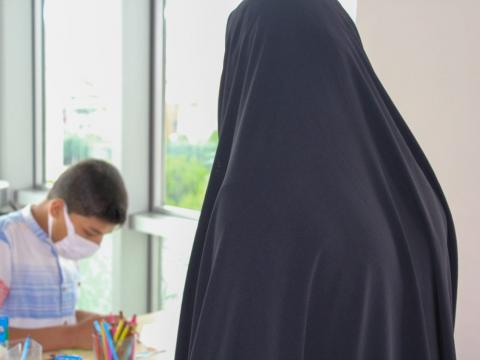World Vision facilitates the integration of Syrian refugees into the Turkish society

Turkey has been hosting the largest population of refugees under temporary and international protection in the world for six years consecutively. In 2020, the number of Syrians under temporary protection passed 3.6 million, 46% of whom are women and girls1. In addition, Turkey hosts approximately 320,000 international protection applicants and status holders from other countries. The Law on Foreigners and International Protection, and the Temporary Protection Regulation, regulates the legal stay, registration, documentation and access to rights and services for foreigners in Turkey. This, however, does not always guarantee a smooth and rapid access to the most needed services for those seeking support for the social services they should be legally entitled to.
Naval, 35, is a single Syrian woman with five children. She has no income other than the occasional support she receives from humanitarian aid organisations and public institutions. The death of her husband in Syria due to a mine explosion in 2017 took a huge toll on her. “I was feeling pain for a month after my husband died and I do not remember exactly what I went through during that time,” she says.
Shortly after her husband’s death, Naval arrived in Turkey with her children. Naval did not know how important it was to carefully keep some of the documents that proved to be necessary for registration in Turkey. This, coupled with the fact that many of Naval’s relatives and friends lived in camps, made Naval worry and stress a lot. Although her children and herself did not encounter any physical danger during their entry to Turkey, lack of documentation and information was the biggest threat for them as a family. She needed to find someone to help her out.
Moving to Turkey means many challenges for any Syrian
A month after arriving to Turkey, the Syrian mother moved to Istanbul where she faced new challenges, including financial difficulties. She did not have any relatives there. “The language barrier is the biggest challenge for me. I am responsible for taking care of five children. I have neither time nor the opportunity to work. When people speak ill of me on the street, I cannot even respond to them in Turkish,” she adds.
The Syrian mother says her Turkish neighbours sometimes pressured her and told her to go back to Syria. “I feel sad that people look down on me everywhere, on the subway, in the street or in the neighbourhood,” she says.
Before Naval heard of the International Blue Crescent (IBC), she had received social and economic support for a few months. However, she could not pay her rent after the financial aid was cut off. As a result, her 14-year-old son Mohammed* had to drop out of school and started working as an industrial worker at a place where he experienced bullying. Naval’s eyes filled with tears when she spoke about Mohammed’s achievements when he was still in school. “I used to cry with happiness when he received certificates of appreciation and achievement from school,” she recalls.
Space to breathe
At the end of 2019, and with the onset of the global pandemic, Naval could not even pay rent. Mohammed was unemployed, too. One of her neighbours suggested that she reach out to IBC Sancaktepe. The case workers started to make an intervention plan in order to cover rent and provide financial aid. Naval received 850 Turkish Liras (85 euros) and all of the children in the family attended psychosocial support sessions with psychologists at the IBC Sancaktepe Info Hub. In spite of the gap in learning, Mohammed managed to get back to school. Owing to the referrals and information given to socio-economic projects, Naval also started to earn a small amount of money from the food packaging business at home. All her children continued their education as normal. This meant less worries for Naval and a future for her children.
Learning for the future
“Despite everything, having the chance to see my children grow up, go to school and be good students makes me feel grateful,” says Naval. “I only hope that they can continue their education and learn how to cope with life by themselves,” she adds. She would also like to attend classes to learn Turkish. Naval wants to be able to respond when there is injustice or discrimination. She wants to stand up for herself.
Between December 2020 and July 2021, IBC teams have reached more than 3,212 people, including 389 children through World Vision’s EU-funded project in Turkey.